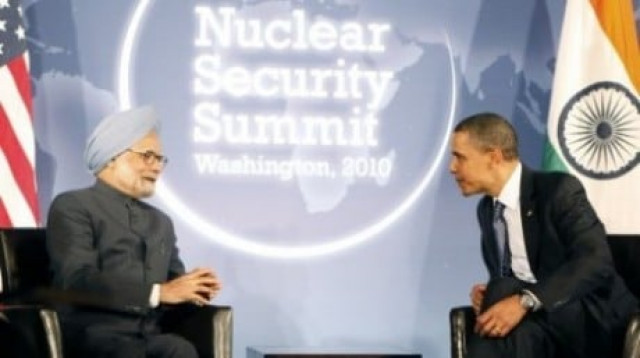The "Great Game" bubbles under Obama's India trip
Touted as a visit with an emerging power, Obama's trip will also be about how India deals with the AfPak conundrum.

After nine years of war, there are signs the United States and President Hamid Karzai are reaching out to talk to the Taliban, and New Delhi wants to ensure any eventual settlement protects India from the risk of militant groups on its doorstep.
That could mean India reaching out for regional initiatives to ensure a stable Afghanistan, including closer ties with Iran and Russia, all Afghan neighbours worried about the Taliban in their backyard, if Washington cuts and runs.
"There is a realisation in India that the United States is not going to preserve your interests. You are going to have to," said Srinath Raghavan, a senior fellow at the Centre for Policy Research in New Delhi. "India is looking more at having an insurance policy in Afghanistan rather than playing an active role"
India and the United States largely see eye to eye over a range of issues as the former Cold War ally of the Soviet Union increasingly turns to the West. The two may see their interests diverge over Afghanistan, although it is little threat to wider ties, as Obama's trip, his longest presidential trip to any one country, shows.
India is Afghanistan's biggest regional aid donor and its $1.3 billion of projects, from building a parliament to a highway to Iran, shows how New Delhi seeks to counter the Taliban.
Washington has been happy to see that aid, but not its ally Pakistan, India's archrival and fellow nuclear power, especially the Pakistan military which sees Afghanistan as its own backyard.
"India thinks that the US is placing too much reliance on Pakistan in Afghanistan, and it's not to be trusted," said Walter Andersen, a former US State Department official now at Johns Hopkins University's School of Advanced International Studies.
He said Obama could take advantage of India's rivalry with Pakistan to pressure Islamabad to do more on Afghanistan. "I've often wondered why he didn't do it earlier," Andersen said.
What India fears most is a return to the 1990s, when the Pakistan-backed Taliban's rule coincided with a spurt in cross-border militant attacks in India, and a sense that militants could act with impunity in the region.
India has already blamed Pakistan for a "proxy war" in Afghanistan that in recent years has seen a car bomb attack on the Indian embassy.
What is Obama thinking?
The trouble for India is knowing exactly what Obama plans to do in Afghanistan - when will troops be withdrawn, or how many? What influence could the Taliban have in any peace settlement ?
US journalist Bob Woodward's new book "Obama's Wars" underscored for many commentators that Obama's administration is deeply divided over its Afghan strategy.
"Once we have clarity what the United States wants to do, we can play the end game," said Siddharth Varadarajan, strategic affairs editor of The Hindu newspaper. "Whether for example to better ties with neighbours like Iran."
That would mean a fine-balancing act over Iran as the United States steps up sanctions. India has already discussed reviving talks over a gas pipeline from Iran and there have been an increasing number of official visits between the two nations.
But so far US ties have improved after hiccups at the start of Obama's presidency, when New Delhi successfully blocked attempts by Washington to include a Kashmir solution as part of a strategy to bring stability to Pakistan and Afghanistan.
India sees Kashmir as a bilateral issue and dismisses any outside influence.
India's relations with Pakistan have been at a low ebb since the Mumbai attacks in 2008 when Pakistani militants crossed over to India's financial hub and killed 166 people.
With Mumbai etched in Indians' minds, New Delhi will likely tell Washington to be cautious about Pakistan and talking to the Taliban, but New Delhi has so far avoided upping tension with Islamabad, a policy that has won plaudits in Washington.
"There's no evidence -- certainly not in the Woodward book -- that the administration thinks of India regarding Afghanistan in terms other than asking it not to pressure Pakistan," Stephen P. Cohen, a senior fellow in foreign policy studies at the Brookings Institution in Washington, wrote in an email reply.
India has also showed reluctance to get embroiled further in Afghanistan. Despite its aid, New Delhi has backed off from more ambitious proposals to train the Afghan army and police. "India is a secondary player in Afghanistan," said C. Raja Mohan, strategic affairs editor at the Indian Express.
So India may push small initiatives, like reinforcing support of leaders linked to the North Alliance – the anti-Taliban grouping which India backed in the 1990s.
"We can't figure out a way to use India, which is a regional power," wrote Cohen. The bitter rivals seem destined to play opposing roles in Afghanistan, he said.



















COMMENTS
Comments are moderated and generally will be posted if they are on-topic and not abusive.
For more information, please see our Comments FAQ